Is Paying Off Student Loans While in College Could Be a Useful Idea?
Paying off student loans while in college can be a good idea for some students, but it’s important to consider all the factors involved before making this decision.
One of the main benefits of paying off student loans while in college is that it can help students to reduce their overall debt burden after graduation. By paying off some of the loans while still in school, students can reduce the interest that accrues on loans, saving them money in the long run.
Another benefit of paying off student loans while in college is that it can help students to establish good credit. Making timely student loan payments can help students build a positive credit history, which can be beneficial for them when they are looking to purchase a car or a home after graduation.
Additionally, paying off student loans while in college can provide students with a sense of financial security. By having the plan to pay off the loans, students can feel more in control of their financial situation and less stressed about the prospect of owing a large amount of money after graduation.
However, there are also some downsides to paying off student loans while in college. One of the main downsides is that it can be difficult for students to make payments while still in school. Many students have limited income while in college, and making payments on student loans can be a financial strain.
Another downside of paying off student loans while in college is that it can limit a student’s ability to spend money on other important things, such as books, housing, and transportation. By dedicating a significant portion of their income to paying off student loans, students may have to make sacrifices in other areas of their lives.
Furthermore, students who pay off student loans while in college may miss out on opportunities to invest their money in other ways that could yield a higher return on investment. For example, they may invest money in a Roth IRA or a 401(k) instead of paying off student loans.
To decide whether paying off student loans while in college is a good idea, students should carefully consider their financial situation and goals. They should also consider their ability to make payments while in school and the potential long-term benefits and drawbacks of paying off the loans early.
It’s also important to remember that, depending on the type of loan and the repayment plan, some student loans have a grace period before payments are due, which can be a good time to start paying off the loan before payments are due.

Reasons to pay off your student loan while still in college
Paying more than the minimum each month, getting a job while in school, or starting a college repayment fund are all good ways to get rid of student loans sooner.
Especially if your student loan has a high interest rate, paying it off early might save you a lot of money. In this case, there will be no prepayment penalty if the obligation is paid off early.
Furthermore, interest begins to accrue from the date of distribution in some loan types, such as unsubsidized federal or private student loans. As a result, it is economically prudent to initiate repayment immediately in order to prevent accrual of interest charges. The interest you can save by starting to pay while still in school is substantial.
To make matters worse, this interest may be capitalised and added to your principle, meaning you’ll end up paying interest on interest. So, it’s preferable if you could start making payments right away. In any event, getting out from under debt early will provide you more freedom and make it easier to achieve other financial goals.
When does it not make sense to pay off your student loans early?
There are certain circumstances in which it may not make sense to pay off your student loans early. Some of these include:
You have high-interest credit card debt:
If you have credit card debt with high interest rates, it may make more sense to pay off that debt first before focusing on your student loans. The high-interest rates on credit card debt can add up quickly, so it’s important to pay that off as soon as possible.
You have other financial goals:
If you have other financial goals, such as saving for a down payment on a house or starting an emergency fund, it may make more sense to prioritise those goals before paying off your student loans early.
You have loans with low-interest rates:
Some student loans, such as federal student loans, have relatively low-interest rates. In this case, paying off your loans early may not save you a significant amount of money in interest charges.
You have loans with loan forgiveness programs:
Some student loans, such as federal student loans, have loan forgiveness programs, where a portion of the loan is forgiven after a certain period of time. If you are eligible for loan forgiveness, it may not make sense to pay off the loans early since you will lose the opportunity to have a portion of the loan forgiven.
You will lose a tax benefit:
If you are paying off student loans with pre-tax dollars, you may lose a valuable tax deduction on the interest paid if you pay off your loans early.
It’s important to consider your individual financial situation and goals before deciding whether to pay off your student loans early. It may make sense for some people to pay off their loans early, while for others it may not be the best decision. It’s always a good idea to talk to a financial advisor or professional before making any financial decisions.
